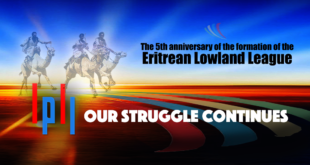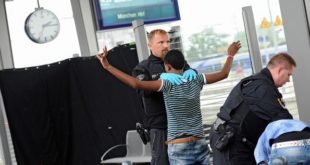Israel stands accused of supplying Ethiopia’s murderous dictator Mengistu with cluster bombs in the early 1990s in exchange for airlifting Ethiopian Jews out of the country.
By Gabriel Pogrund (Eritrea)
MASSAWA, ERITREA − Massawa is a broken city.
Half of its once busy port is rubble and the surviving buildings struggle to stand up. Iron rods and barbed wire prod out of their crumbling Ottoman facades, as if to warn visitors “come no further.” But few visit anyway.
On this street, like many, people still sleep on fold up field hospital beds. Gabriel Pogrund
The streets are empty, the 44 degrees Celsius heat too oppressive for anyone to come out. It is silent, save for the caw of crows and the soft purr of a café’s electricity generator. Even the Red Sea doesn’t make a sound.
This is Africa’s secret Aleppo, and like that infamous Syrian city, it was devastated by the indiscriminate weapon which most of the world’s countries have had the good sense to ban: cluster bombs.
– Skip
Today, few outside of Eritrea remember the massacre at Massawa, where 50,000 people still live, but in this abandoned port, the bombed-out Ottoman buildings and their residents bear witness to what happened with such clarity, it is difficult to forget.
The bombardment in 1990 was a last-ditch attempt by Ethiopia to demoralize the Eritrean guerrilla movement, which had liberated Massawa and stood on the cusp of winning independence after one of the longest-running guerilla wars in history.
Warplanes circulated around the bay for days, relentlessly bombing civilian areas. Napalm instantly incinerated buildings – and their inhabitants – at temperatures of 1,000 degrees Celsius. Cluster bombs landed and sent lethal ‘sub-explosives’ propelling in random directions, killing children and blowing off their parents’ limbs.
“Mengistu [Haile Mariam] has decided to burn us like wood,” a resident said of Ethiopia’s Marxist dictator at the time. Massawa was indeed some bonfire: Unpublished pictures from the massacre show a confused child whose back has been turned into raw flesh, a survivor whose face has been burnt off, and bodies lying face-down on the blood-stained streets.
Who armed the murderous Ethiopian warlord Lieutenant Colonel Mengistu, now convicted of killing half a million of his own citizens during his regime’s death throes?
Mural of an Eritrean resistance fighter, themed with the country’s colors, facing the Red Sea. Gabriel Pogrund
It wasn’t Washington. It wasn’t the Kremlin. As memos, foreign press reports and the person who brokered the deal have since revealed, it was the Israeli Knesset.
Israel would not confirm the allegations levelled against it at the time. Ruth Yaron, its spokesperson in Washington, told an LA Times reporter in 1990: “We don’t sell cluster bombs to Ethiopia, and we don’t give them either.” Probed on whether Israel had sent them in the past, she replied, “I wouldn’t be able to answer that.” This was little surprise, as Israel had historically declined to say whether it was sending arms and military advisors to Ethiopia.
But a confidential Congressional document leaked to Washington’s Jewish press, as well as foreign reports by newspapers and human rights organizations provided details about the alleged events. And the historical literature written since – including the memoirs of Herman Cohen – has examined them in depth.
–
–
Source: Haaretz
 ELL Eritrean Lowland League
ELL Eritrean Lowland League




